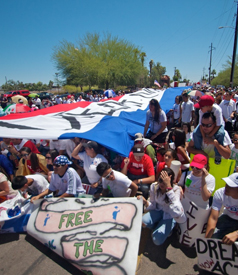Vietnam War-era veteran and member of the Phoenix Veterans for Peace chapter, David Winkler, was one of 50,000 people who converged in Phoenix on May 29th to protest Arizona Senate Bill 1070. “In Iraq and Afghanistan, as well as on the U.S.-Mexico border, the U.S. is attempting to use the military to solve social problems,” he said. “Immigration is not a military problem, and it should not be dealt with by the military.“
Signed into law on April 23rd of this year, Arizona SB 1070 mandates that police check the papers of anyone they suspect of being undocumented and cross-check their names with Immigration and Customs Enforcement (ICE) databases. It also makes it a crime for non-citizens to go anywhere without their papers and for people to hire, transport, or house anyone without documentation. The bill follows a spate of political initiatives in cities, towns, and states around the country to further criminalize hiring and transporting undocumented people. Meanwhile, President Obama is expanding “Secure Communities,” a program that mandates increased local police collaboration with ICE, leading to drastic spikes in deportations, county by county.
In the immediate wake of the SB 1070, President Obama announced that he would send an additional 1,200 troops to the U.S.-Mexico border and an additional $500 million to “secure the border,” even though he has publicly condemned the bill. Critics say that this is an attempt to appease far-right and anti-immigrant forces who appear to be gaining political headway.
“The military is not what we need,” said Saba Waheed who traveled from Los Angeles to participate in the massive mobilization in Phoenix. “Immigrants are being scapegoated for the economic crisis. What we need is to directly address poverty.”
People from around the country and across Arizona gathered in the blazing hot streets of Phoenix on Saturday, responding to a call for a national protest against SB 1070 from local organizers, including Puente and National Day Laborers Organizing Network. Tens of thousands of people marched, winding five miles under a mid-day sun, filling the streets with shouting, chanting, and singing. Families pushed strollers, high school students shouted chants, roving bands played instruments, and many held signs that read “Is this what illegal looks like?” A quick sampling of the crowd found people who had traveled from New York, San Francisco, Mississippi, and Alabama. Onlookers waved from rooftops and front stoops as the protesters streamed past.
The march took place less than 200 miles away from a U.S.-Mexico border that has become increasingly militarized over the past decade. The Bush years brought a drastic increase in policing of the area: from 2006 to 2008, the number of US Border Patrol officers increased from 10,000 to 20,000, and the federal border wall, which spanned twenty miles in 2006, now stretches for 700 miles. The past several years have seen huge increases in criminal prosecutions for offenses related to undocumented status. Every year, hundreds, possibly thousands, of immigrants die attempting to cross the unforgiving deserts of Arizona, while running from the border police and white supremacist vigilante groups that patrol the border, as groups like the Minutemen attempt to gain footing in the borderlands. Hundreds of bodies are found, and many more are not. It is difficult to know how many deaths are intentional, vigilante killings.
Obama’s call for increased military presence at the border punishes migrants for this deepening humanitarian crisis, increasing the insecurity and policing of people whose lives and safety are already at risk. As the war in Iraq passes its seventh year, and Obama calls for a troop surge in Afghanistan, the escalation of troops at the border appears to be part of a larger strategy: responding to perceived social problems with increased military presence. “The military is not making anyone in Iraq any safer, and the military at the border won’t make any of us safer,” said Winkler.
Anti-militarist messages surfaced throughout the march, with signs and slogans decrying the use of resources for militarization and punishment, rather than solutions that address the root causes of poverty. “The Phoenix anti-war community has been outspoken against SB 1070 since the beginning,” said Winkler.
Nitza Rubenstein, who was wearing an “Army” t-shirt, explained that her youngest son is a soldier currently stationed in Iraq. “He is Hispanic,” she said. “He has been deployed to Iraq three times. Yet, when he comes home, he could be stopped and harassed in the streets by our police.” She went on to say that she is not categorically against policing the borders, but rather, she wants her son to have basic human rights when he returns.
Others roundly condemned the militarization of the border under the guise of security. “Obama is sending troops and money to the border to establish border security,” said Isabel Garcia, co-chair of the Tucson-based Coalition for Human Rights and legal defender of Pima County, at the People’s Movement Assembly on the day following the march. “This brings nothing but insecurity, death, and destruction to our communities.”
Join us in defending the truth before it’s too late
The future of independent journalism is uncertain, and the consequences of losing it are too grave to ignore. We have hours left to raise the $12,0000 still needed to ensure Truthout remains safe, strong, and free. Every dollar raised goes directly toward the costs of producing news you can trust.
Please give what you can — because by supporting us with a tax-deductible donation, you’re not just preserving a source of news, you’re helping to safeguard what’s left of our democracy.
